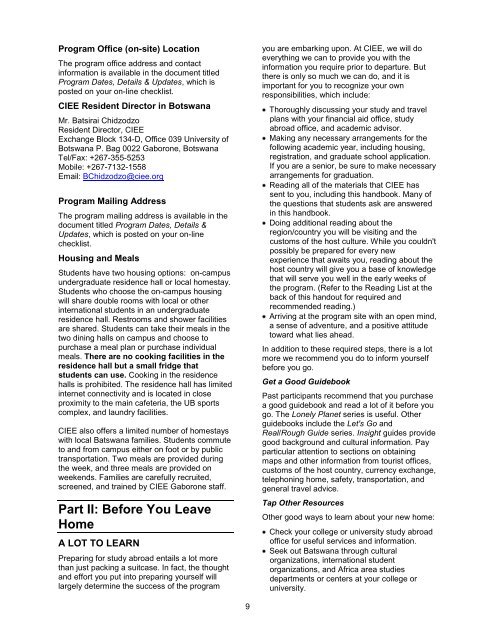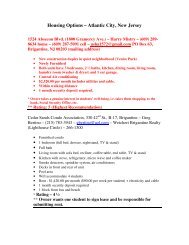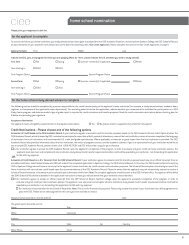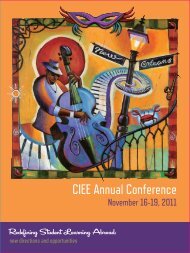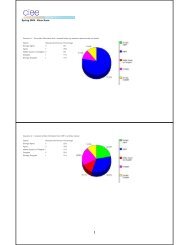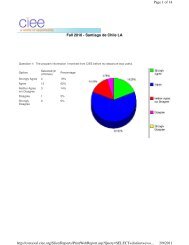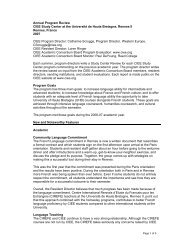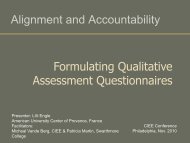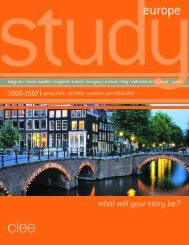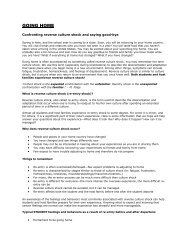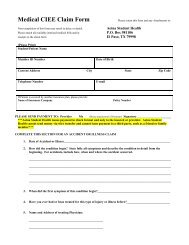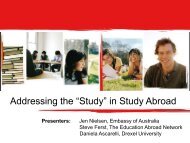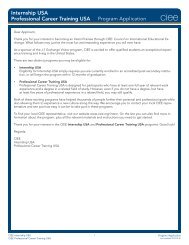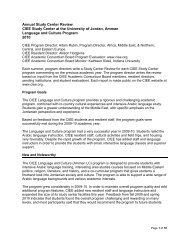botswana - Council on International Educational Exchange
botswana - Council on International Educational Exchange
botswana - Council on International Educational Exchange
You also want an ePaper? Increase the reach of your titles
YUMPU automatically turns print PDFs into web optimized ePapers that Google loves.
Program Office (<strong>on</strong>-site) Locati<strong>on</strong><br />
The program office address and c<strong>on</strong>tact<br />
informati<strong>on</strong> is available in the document titled<br />
Program Dates, Details & Updates, which is<br />
posted <strong>on</strong> your <strong>on</strong>-line checklist.<br />
CIEE Resident Director in Botswana<br />
Mr. Batsirai Chidzodzo<br />
Resident Director, CIEE<br />
<strong>Exchange</strong> Block 134-D, Office 039 University of<br />
Botswana P. Bag 0022 Gabor<strong>on</strong>e, Botswana<br />
Tel/Fax: +267-355-5253<br />
Mobile: +267-7132-1558<br />
Email: BChidzodzo@ciee.org<br />
Program Mailing Address<br />
The program mailing address is available in the<br />
document titled Program Dates, Details &<br />
Updates, which is posted <strong>on</strong> your <strong>on</strong>-line<br />
checklist.<br />
Housing and Meals<br />
Students have two housing opti<strong>on</strong>s: <strong>on</strong>-campus<br />
undergraduate residence hall or local homestay.<br />
Students who choose the <strong>on</strong>-campus housing<br />
will share double rooms with local or other<br />
internati<strong>on</strong>al students in an undergraduate<br />
residence hall. Restrooms and shower facilities<br />
are shared. Students can take their meals in the<br />
two dining halls <strong>on</strong> campus and choose to<br />
purchase a meal plan or purchase individual<br />
meals. There are no cooking facilities in the<br />
residence hall but a small fridge that<br />
students can use. Cooking in the residence<br />
halls is prohibited. The residence hall has limited<br />
internet c<strong>on</strong>nectivity and is located in close<br />
proximity to the main cafeteria, the UB sports<br />
complex, and laundry facilities.<br />
CIEE also offers a limited number of homestays<br />
with local Batswana families. Students commute<br />
to and from campus either <strong>on</strong> foot or by public<br />
transportati<strong>on</strong>. Two meals are provided during<br />
the week, and three meals are provided <strong>on</strong><br />
weekends. Families are carefully recruited,<br />
screened, and trained by CIEE Gabor<strong>on</strong>e staff.<br />
Part II: Before You Leave<br />
Home<br />
A LOT TO LEARN<br />
Preparing for study abroad entails a lot more<br />
than just packing a suitcase. In fact, the thought<br />
and effort you put into preparing yourself will<br />
largely determine the success of the program<br />
you are embarking up<strong>on</strong>. At CIEE, we will do<br />
everything we can to provide you with the<br />
informati<strong>on</strong> you require prior to departure. But<br />
there is <strong>on</strong>ly so much we can do, and it is<br />
important for you to recognize your own<br />
resp<strong>on</strong>sibilities, which include:<br />
Thoroughly discussing your study and travel<br />
plans with your financial aid office, study<br />
abroad office, and academic advisor.<br />
Making any necessary arrangements for the<br />
following academic year, including housing,<br />
registrati<strong>on</strong>, and graduate school applicati<strong>on</strong>.<br />
If you are a senior, be sure to make necessary<br />
arrangements for graduati<strong>on</strong>.<br />
Reading all of the materials that CIEE has<br />
sent to you, including this handbook. Many of<br />
the questi<strong>on</strong>s that students ask are answered<br />
in this handbook.<br />
Doing additi<strong>on</strong>al reading about the<br />
regi<strong>on</strong>/country you will be visiting and the<br />
customs of the host culture. While you couldn't<br />
possibly be prepared for every new<br />
experience that awaits you, reading about the<br />
host country will give you a base of knowledge<br />
that will serve you well in the early weeks of<br />
the program. (Refer to the Reading List at the<br />
back of this handout for required and<br />
recommended reading.)<br />
Arriving at the program site with an open mind,<br />
a sense of adventure, and a positive attitude<br />
toward what lies ahead.<br />
In additi<strong>on</strong> to these required steps, there is a lot<br />
more we recommend you do to inform yourself<br />
before you go.<br />
Get a Good Guidebook<br />
Past participants recommend that you purchase<br />
a good guidebook and read a lot of it before you<br />
go. The L<strong>on</strong>ely Planet series is useful. Other<br />
guidebooks include the Let's Go and<br />
Real/Rough Guide series. Insight guides provide<br />
good background and cultural informati<strong>on</strong>. Pay<br />
particular attenti<strong>on</strong> to secti<strong>on</strong>s <strong>on</strong> obtaining<br />
maps and other informati<strong>on</strong> from tourist offices,<br />
customs of the host country, currency exchange,<br />
teleph<strong>on</strong>ing home, safety, transportati<strong>on</strong>, and<br />
general travel advice.<br />
Tap Other Resources<br />
Other good ways to learn about your new home:<br />
Check your college or university study abroad<br />
office for useful services and informati<strong>on</strong>.<br />
Seek out Batswana through cultural<br />
organizati<strong>on</strong>s, internati<strong>on</strong>al student<br />
organizati<strong>on</strong>s, and Africa area studies<br />
departments or centers at your college or<br />
university.<br />
9


